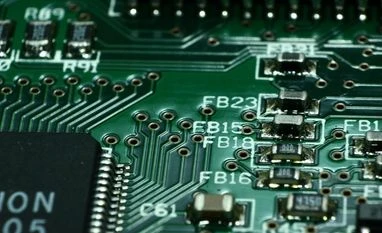Amber rallies 8% in 3 days on JV with Korean Circuit for manufacturing PCBs
Amber Enterprises share price: Amber Group, through its subsidiary IL JIN Electronics, and Korea Circuit will hold 70 per cent and 30 per cent ownership, respectively, in this JV
)
The Indian electronics industry is poised for significant growth
Listen to This Article
Amber Enterprises share price hit a new high of Rs 5,405 on the BSE today. Amber Enterprises shares gained 5 per cent in Wednesday's intraday trade, in an otherwise weak market.
In the past three days, the stock of the household appliances company has rallied 8 per cent after Amber group and Korea Circuit announced a Joint Venture (JV) to manufacture printed circuits boards (PCBs) in India.
The JV sets the strategic foray into high technology and advanced manufacturing of HDI, Flex and Semiconductor substrates PCBs. This collaboration embarks on the shared vision of bringing world class technology and manufacturing excellence to India and caters to the fast growing domestic electronics demand.
Amber Group, through its subsidiary IL JIN Electronics, and Korea Circuit will hold 70 per cent and 30 per cent ownership, respectively, in this JV. In line with the 'Aatmanirbhar Bharat' vision of Government of India, this JV further strengthens the domestic value addition of the industry and capabilities for import substitution, the company said in a stock exchange filing.
"On way forward, we will begin scouting for land to co-create a new state-of-art facility, while we await the finalisation of the Government's plan on Electronics Components Manufacturing Scheme," Amber Enterprises said.
Also Read
Favorable policies and schemes by the government to create a local electronics component ecosystem played a pivotal role in localisation of printed circuits board assemblies (PCBAs) in the country. However, PCBAs worth $ 5.32 billion are still imported, which presents us with an opportunity for substituting imports, Amber had said in its FY24 annual report.
The PCB bare board market in India is growing at a compounded annual growth rate (CAGR) of 11 per cent. This year, the market for PCBs stood at around $4.5 billion (85 per cent of requirements were met through imports) and is expected to reach $9.2 billion by 2030, which presents us with a myriad of opportunities to capture the domestic market by substituting imports, the company said.
With Ascent and Korea Circuits in the company's fold, the management said Amber will be able to offer various grades of PCBs viz. single layer, double layer, multi-layer, flex PCBs, HDI and semiconductor substrates, thereby expanding its solutions in the segment of consumer electronics, medical devices, defence, aerospace, automobile (EV & ICE), mobile, smart energy, IT & telecom and many others.
The Indian electronics industry is poised for significant growth, driven by government initiatives, increasing domestic demand, and a focus on higher value addition in components and product development. The industry is expected to reach $115 billion in 2024, with the semiconductor market witnessing proportional growth.
Electronics manufacturing services (EMS), encompassing designing, manufacturing, testing, distribution, and servicing of electronic components and assemblies for OEMs, are pivotal to this growth. The growth is driven by increased outsourcing by original equipment manufacturers (OEMs), the China plus One strategy, and the development of the domestic electronics ecosystem. The mobile, consumer electronics, and appliances segments are expected to record a CAGR of 31.5 per cent over the next five years, providing growth opportunities for strategic and financial investors, the company said.
Amber is one of the most backward integrated and comprehensive solution providers in the segment of room air conditioners (RAC), RAC components and Non-RAC components. Over the years, this segment has distinguished itself from a luxury to necessity and its appetite for investment potential, driven by the growing demand for cooling solutions in households, construction, infrastructure, and hospitality.
Government support, coupled with advancements like energy efficiency and AI integration, is further reshaping this industry. The recent Production Linked Incentive (PLI) scheme acted as a catalyst in creation of a local component ecosystem for the air conditioning industry. The local value addition in the RAC sector, which was around 25 per cent in 2021, today stands at more than 50 per cent after this scheme and is expected to reach up to 75 per cent by 2028, Amber said in its FY24 annual report.
Moreover, the demand for commercial air conditioning is also on the rise and is projected to capture 30 per cent of the market share, bolstered by demand from key sectors in Tier 1 & Tier 2 cities.
More From This Section
Don't miss the most important news and views of the day. Get them on our Telegram channel
First Published: Oct 16 2024 | 1:27 PM IST